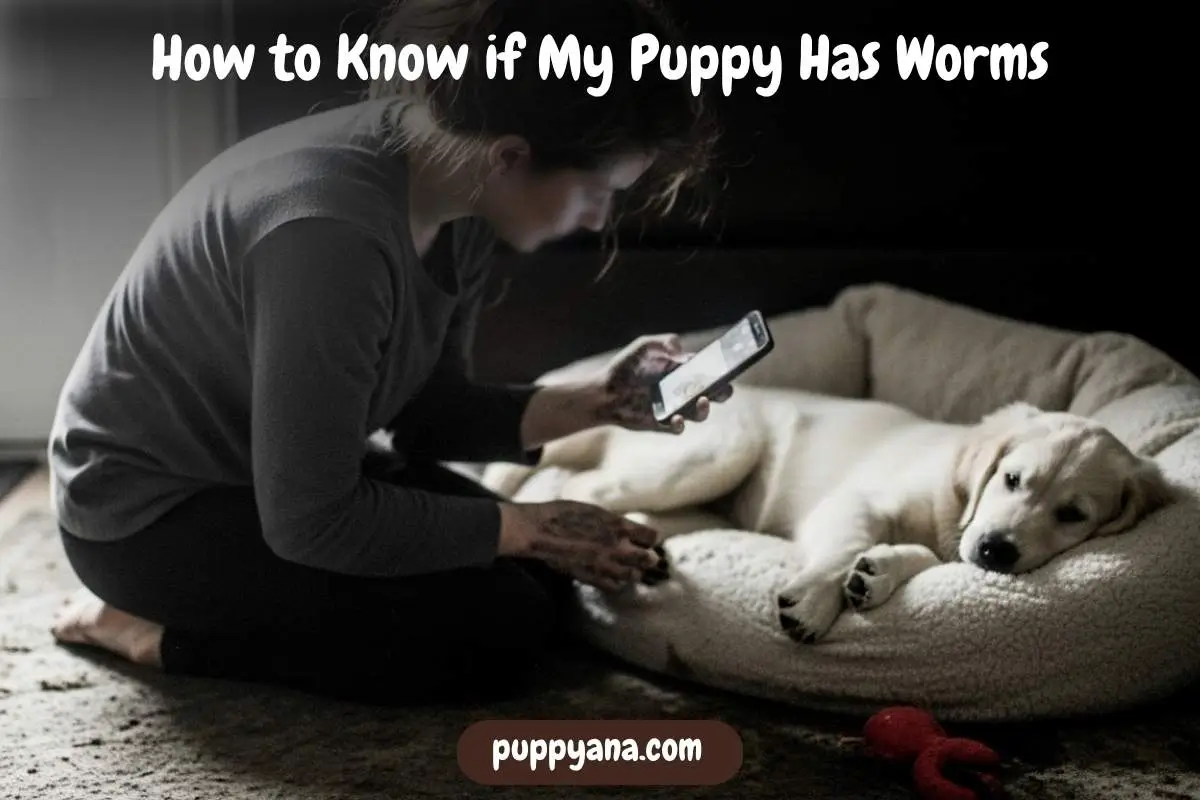If your dog can’t stop licking their paws, they’re not just “being weird”, they’re probably trying to tell you something. From allergies to dry skin to stress, paw licking is a symptom, not just a habit.
And good news? You don’t always need expensive treatments. In many cases, you can manage or even stop the problem with safe home remedies.
In this guide, we’ll go step-by-step through how to stop dog from licking paws home remedy style—plus causes, prevention tips, and when it’s time to call the vet.
Let’s dig in (not like your dog does with their teeth).
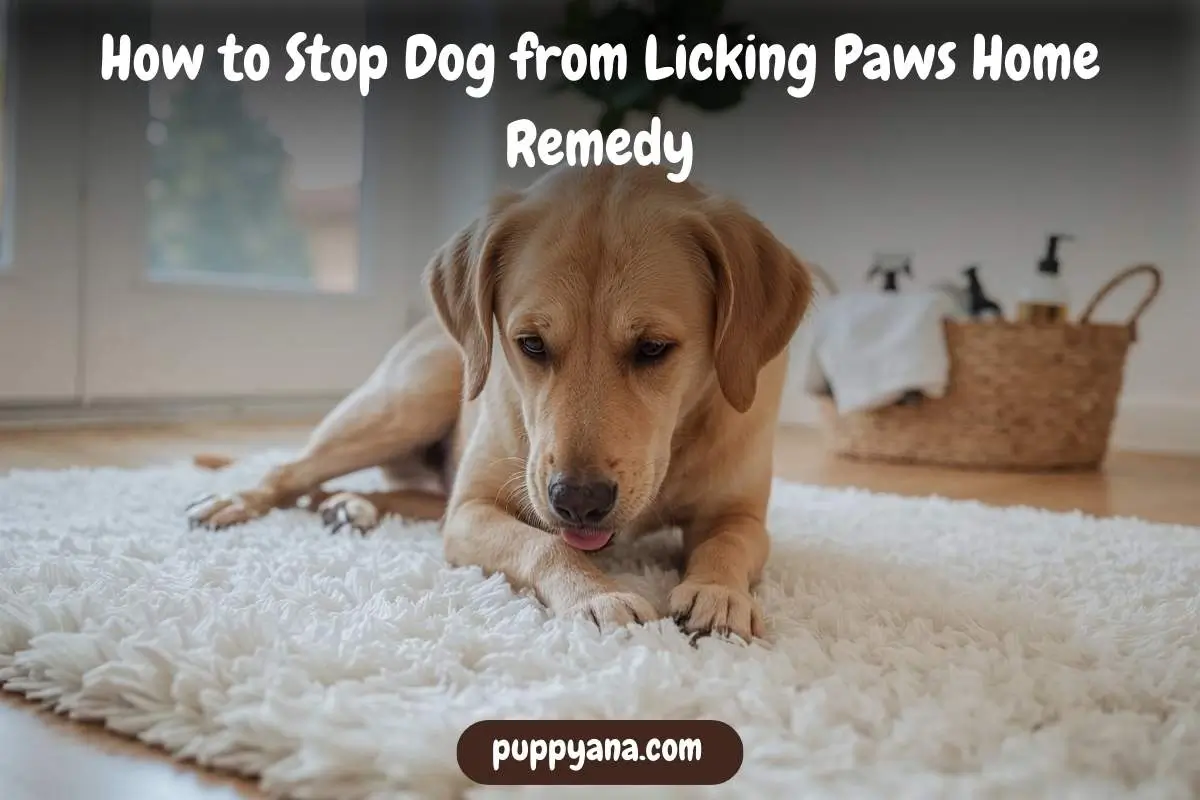
Table of Contents
ToggleWhy Dogs Lick Their Paws in the First Place
Before you treat it, you need to understand what’s causing it. Dogs instinctively lick to:
- Soothe irritation
- Clean small wounds
- Deal with stress or boredom
- Relieve itchiness from allergies or contact reactions
According to PetMD, compulsive licking can develop if left unresolved, leading to secondary infections or hot spots.
Top causes of paw-licking:
- Environmental Allergies
- Food Sensitivities
- Seasonal Dryness
- Yeast or Bacterial Infections
- Parasites (like fleas or mites)
- Anxiety or boredom
- Cuts, burns, or lodged debris
Identify what’s triggering the licking so you can pick the right remedy.
How to Tell If It’s a Medical Issue
Sometimes you can fix paw licking at home. Other times, it’s time for professional care.
Call Your Vet If:
- You see redness or swelling
- The paw is bleeding or oozing
- Your dog cries or limps
- There’s a musty smell (a sign of yeast)
- Licking is sudden and intense
The ASPCA notes that persistent licking may indicate a deeper issue, especially fungal or bacterial infections, which require vet-guided treatment.
But for early-stage, mild cases? The right home remedy may be enough to stop the licking long before it gets serious.
10 Best Home Remedies to Stop Dog Paw Licking
Let’s dive into how to stop dog from licking paws home remedy style, starting with safe treatments you can try right away.
1. Epsom Salt Soak
Soak your dog’s paws in warm water + unscented Epsom salt (1–2 tablespoons per quart of water).
- Reduces inflammation
- Speeds up healing
- Soothes surface irritation
Soak for 5–10 minutes daily, then dry thoroughly.
2. Apple Cider Vinegar Spray (Diluted)
ACV is an excellent antibacterial and anti-fungal spray. Mix:
- 50% water / 50% raw apple cider vinegar
- Spray on paws once dried
⚠️ Do not apply to cracked skin or open cuts, it will sting.
3. Coconut Oil Rub
Coconut oil has antifungal, antibacterial, and moisturizing properties. Warm it slightly until melted and gently massage onto clean paws.
Let your dog rest indoors until it soaks in (20–30 min is enough).
4. Chamomile or Green Tea Soak
Brew 2–3 tea bags in 2 cups of hot water. Let cool fully and soak paws for 5–10 minutes.
Calms itchiness naturally and is gentle on irritated skin.
5. Oatmeal Paste
Grind plain oats into fine powder and mix with water into a thick paste. Apply to affected areas for 10–15 minutes.
Great for dogs with seasonal allergies or itchy skin.
6. Fish Oil Supplements
If licking is related to dry skin, support from the inside helps. Omega-3s reduce inflammation and support a healthy skin barrier.
Ask your vet to recommend doses based on weight.
7. Aloe Vera (Pet-Safe Gel Only)
Cool, soothing aloe can reduce heat and annoying itch. Use only pet-safe aloe, as raw aloe latex (from the skin) is toxic to dogs if ingested.
8. Calming Chews
If licking is due to anxiety or boredom, chew-style naturopathic supplements help relax nerves gently without drowsiness.
They combine chamomile, tryptophan, and L-theanine—ingredients shown to ease stress and obsessive licking behaviors.
9. Turmeric Paste
A natural anti-inflammatory. Mix with coconut oil and apply gently for arthritic or painful paws.
You can also add it to food, but talk to a vet before adding larger doses.
10. Distraction, Exercise, and Toys
Many dogs lick because they’re bored.
- Add 15–30 more minutes of active play each day.
- Use chew toys and puzzle feeders during down time.
- Train “leave it” or “drop it” cues for excessive licking.
As AKC notes, mental stimulation is as important as physical activity in tackling behavior-related paw-licking.
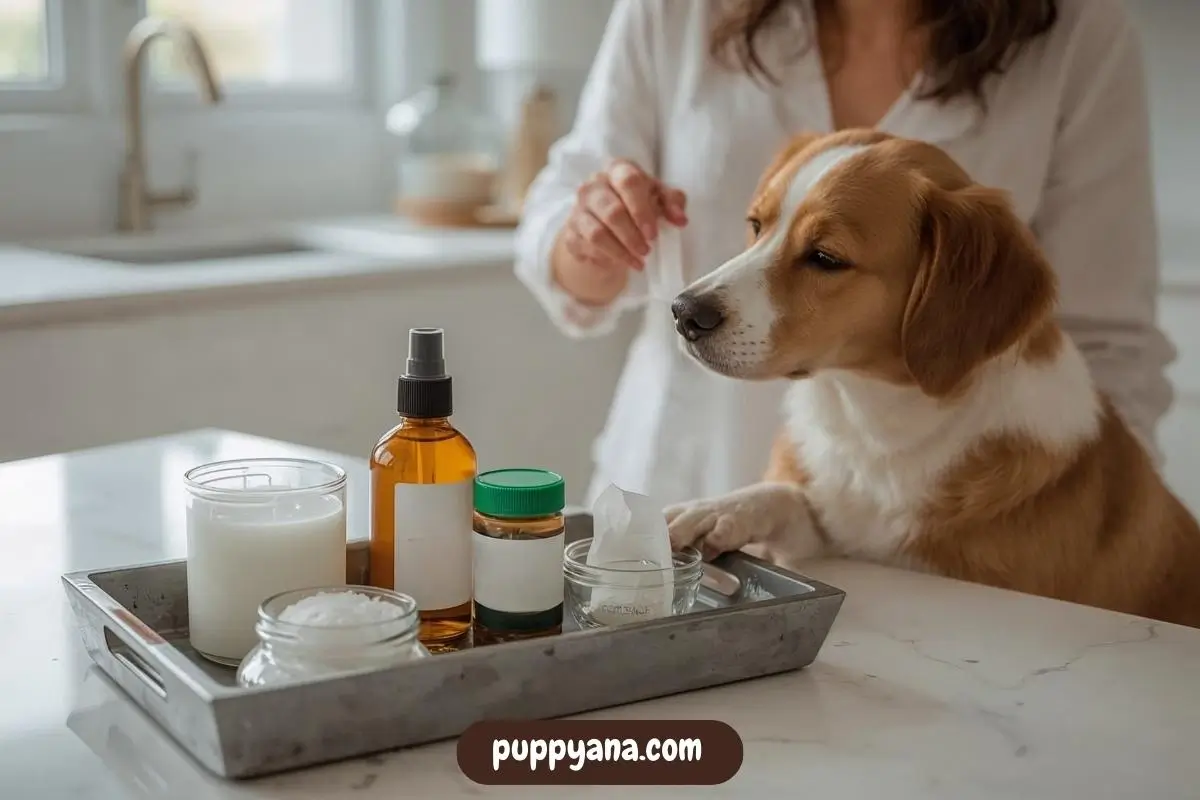
How to Stop Dog from Licking Paws Home Remedy for Allergies
If allergies are behind the issue, you’ll need a remedy that calms histamine reactions naturally. Many dogs react to grass, household dust, or pollen that cling to paws after walks.
Here’s how to stop dog from licking paws home remedy, when allergies are the root cause:
Allergen-Busting Home Remedies:
- Wipe paws with hypoallergenic baby wipes after each walk
- Dunk paws in chamomile tea soaks every evening to reduce irritation
- Use an air purifier indoors to reduce airborne allergens
- Sprinkle colloidal oatmeal powder in lukewarm water for anti-itch soaks
- Switch to grain-free or single-protein diets during allergy season
PuppyAna often recommends brands like Zesty Paws, Vet’s Best, and Honest Paws for their natural allergy-friendly relief items.
For more serious flare-ups, antihistamines (prescribed) may be needed, ask your vet before use.
How to Keep Your Dog from Licking After You Treat
Even if you apply the best remedy, your dog will instinctively go back to licking, especially while it’s healing.
Here’s how to stop dog from licking paws home remedy or not:
Use These Tools:
- Soft recovery cone for rest hours
- Dog socks or booties
- Vet-approved licking deterrent spray
- Interactive toys during the “no-lick” period
- Supervision when the skin is raw or healing
Try to redirect behavior rather than only blocking it—otherwise, the frustration builds up.
How to Stop Dog from Licking Paws Home Remedy for Senior Dogs
Older dogs commonly lick their paws due to:
- Arthritis discomfort
- Decreased mobility
- Skin dryness
- Boredom during long rest hours
Here’s how to stop dog from licking paws home remedy tailored to aging pets:
Recommended for Seniors:
- Massage paws gently with unscented coconut oil
- Use a microwavable heating pad or warm towel wrap for joint comfort
- Add orthopedic bedding that takes pressure off their legs
- Incorporate turmeric or collagen-rich treats recommended by brands like Zesty Paws or Doggie Dailies
PuppyAna recommends checking ingredients to ensure there’s no synthetic filler, senior skin can be more sensitive.
Extra patience and redirecting their behavior with enrichment toys can make a noticeable difference in older dogs.
Daily Care Tips to Prevent Paw-Licking Long Term
Once you get rid of the problem, keep it gone by adopting these simple, low-cost saftey steps.
Build This Routine:
- Wipe paws after every walk
- Check between toes for debris
- Clip long hair around paws regularly
- Moisturize pads when they’re dry
- Avoid chemical-treated grass or salt in winter
For sensitive skin dogs, PuppyAna’s suggested Paw & Pad Balm creates a natural protective barrier before and after outdoor walks.
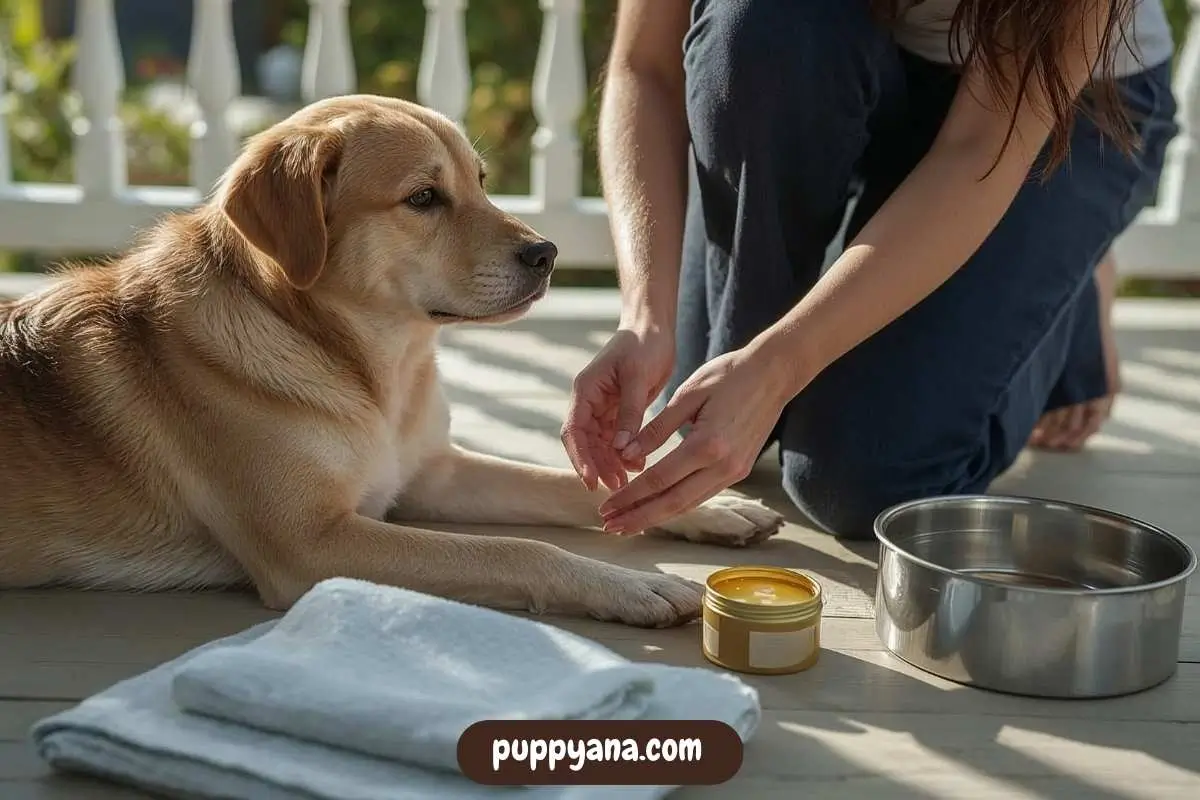
What Not to Use for Paw-Licking Relief
Not every “home solution” on the internet is good.
Avoid These:
- Human creams (like Neosporin, hydrocortisone—most are toxic to ingest)
- Essential oils (especially tea tree, eucalyptus), unless heavily diluted
- Rubbing alcohol
- Hot water soaks
- Applying plastic or a tight wrap directly on the paw
According to VCA Animal Hospitals, accidentally using human anti-itch creams is a common cause of toxicity in treated dogs.
When to See a Vet Instead
If your home treatments aren’t delivering results within 5–7 days, don’t wait, schedule a visit.
Time to call for help if:
- Licking is worsening or spreading
- Paw is clearly inflamed or bleeding
- There’s a yellowish drainage or smell
- Your dog is limping or losing energy
- You’ve used more than three remedies with no effect
Some serious issues like interdigital cysts, autoimmune disease, or infections need prescription medications.
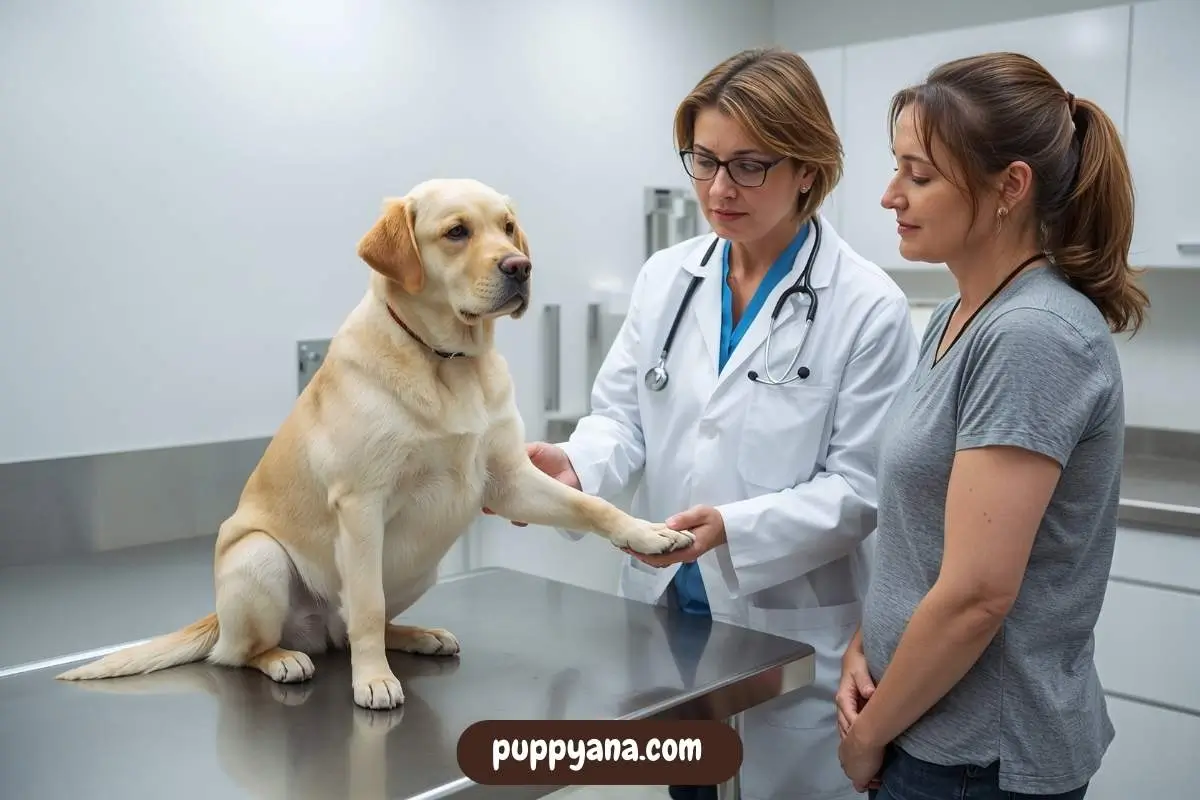
How to Stop Dog From Licking Paws Home Remedy with Diet Support
You can stop symptoms a lot faster or prevent them altogether by feeding for immune and skin health.
Add These:
- Omega-3 fish oil supplements (for inflammation)
- Probiotics
- Fresh foods rich in vitamin A and biotin (like cooked carrots, green beans)
Avoid low-quality kibble loaded with grains or artificial fillers. Many skin disorders stem from gut and allergy issues, not just surface problems.
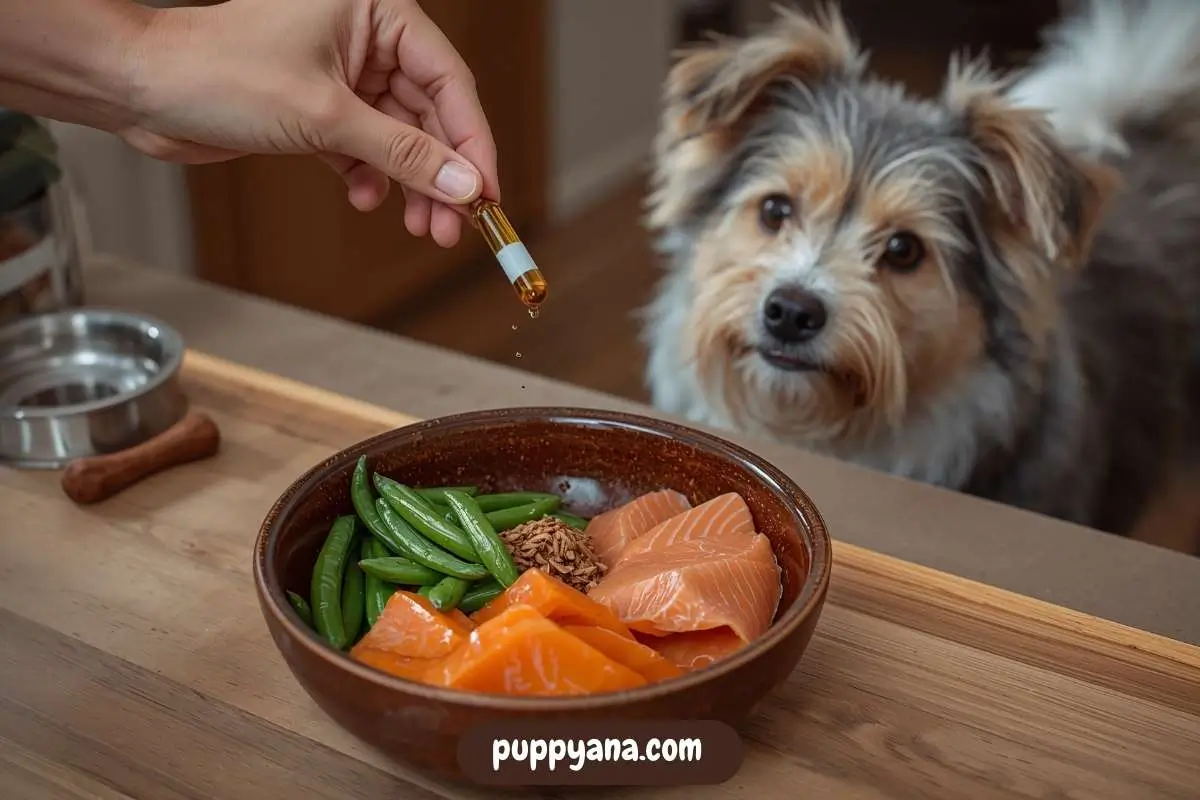
Simple DIY Paw Balm Recipes You Can Make at Home
Many dogs deal with dry, itchy paws from weather, rough sidewalks, or chemicals like road salt. Moisturized paws = less licking.
Here’s how to stop dog from licking paws home remedy using things already in your kitchen.
Easy DIY Paw Balm:
Basic Recipe:
- 2 tbsp coconut oil
- 1 tbsp olive oil
- 1 tbsp shea butter or beeswax (melted)
- Optional: A few drops of vitamin E oil (avoid essential oils)
Directions:
- Warm all ingredients gently in a double boiler
- Stir and pour into a small container
- Let it cool fully before using
- Apply sparingly to clean, dry paws
Store in a cool, dark cabinet and use within 2–3 months. PuppyAna frequently suggests this mix for pet owners looking for chemical-free options that dogs won’t mind.
Conclusion
Knowing how to stop dog from licking paws home remedy style gives you control without immediately turning to medications.
Start by identifying the cause and treat it with:
- Soaks
- Natural moisturizers
- Diet improvements
- Calming aids
- Lick-proofing techniques
At the same time, stop the behavior from turning into a habit.
With the right toolkit and a little patience, you’ll keep your dog happy, healthy, and paw-lick free.
Frequently Asked Questions
Why does my dog keep licking his paws all the time?
It could be allergies, pain, dryness, or stress. Rule out medical causes first. Use home soaks and balms as a start.
Is paw licking always a sign of allergies?
Not always, but allergies are a top cause. Behavioral issues, injury, or yeast infections are also common.
Can I stop my dog’s licking with apple cider vinegar?
Yes, in diluted form. Avoid open cuts or raw skin as it may sting.
How many days do I try home remedies before going to the vet?
If the licking doesn’t improve after 5–7 days, or worsens, contact your vet.
Are coconut oil and fish oil both safe for dogs?
Yes, when used properly, both can improve skin and reduce licking due to dryness.


